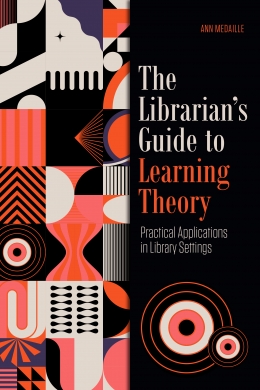
The Librarian's Guide to Learning Theory: Practical Applications in Library Settings
Customers outside of North America (USA and Canada) should contact Facet Publishing for purchasing information.
Primary tabs
You don't need to be an ALA Member to purchase from the ALA Store, but you'll be asked to create an online account/profile during checkout to proceed. This Web Account is for both Members and non-Members. Note that your ALA Member discount will be applied at the final step of the checkout process.
If you are Tax-Exempt, please verify that your account is currently set up as exempt before placing your order, as our new fulfillment center will need current documentation. Learn how to verify here.
- Description
- Table of Contents
- About the author
- Reviews
Listen to a podcast featuring the author now!
Demonstrating how learning theories are applicable to a variety of real-world contexts, this book will help library workers better understand how people learn so that they can improve support for instruction on their campuses and in their communities.
From makerspaces to book clubs, from media facilities to group study spaces, from special events to book displays, libraries support learning in numerous ways. In this accessible handbook, Medaille unchains the field of learning theory from its verbose and dense underpinnings to show how libraries can use its concepts and principles to better serve the needs of their users. Readers will discover
- concrete ways to improve library instruction, spaces, services, resources, and technologies;
- succinct overviews of major learning theories drawn from the fields of psychology, education, philosophy, and anthropology, among others;
- summaries of the most relevant aspects of each theory and instructional methods, showing how the various theories interact and support each other;
- chapters organized into 14 learning topics, including motivation, self-regulation, collaboration, and inquiry;
- discussion of a range of instruction situations from information literacy instruction to the teaching of maker or media skills; and
- teaching librarian's tips, reflection questions, and suggestions for further reading at the end of each chapter.
Examination copies are available for instructors who are interested in adopting this title for course use.
Acknowledgments
Introduction
Chapter 1 Constructing Knowledge
Chapter 2 Collaboration
Chapter 3 Attention
Chapter 4 Multimedia
Chapter 5 Observation
Chapter 6 Self-Regulation
Chapter 7 Motivation
Chapter 8 Affect
Chapter 9 Context
Chapter 10 Dialogue
Chapter 11 Inquiry
Chapter 12 Imagination
Chapter 13 Guidance
Chapter 14 Individual Differences
Index
Ann Medaille
Ann Medaille is the director of research and instructional services at the University of Nevada, Reno Libraries, and serves as editor-in-chief of the journal Evidence Based Library and Information Practice. She has published several journal articles on topics related to educational theories and pedagogies.
Have you read this book? Leave a review!
"Medaille offers a concise collection of 14 chapters on different learning theories, including collaboration, observation, motivation, dialogue, imagination, and more. Medaille endeavors to make these learning theories accessible, providing a systematic and structured format to explain the concepts, their associated implications, and applications in librarianship ... A user-friendly work that provides librarians with a quick tool to better understand learning theories in relation to librarianship. Excellent for both seasoned and new librarians, this resource is highly recommended for all types of libraries."
— Library Journal (starred review)
"Through the clarity of her writing, the author gives the reader the vocabulary needed to successfully articulate—and reflect on—learning moments librarians may have experienced themselves in their work with students, and to link these with relevant, contributing theories. This may lead the reader to reflect on their own actions or contributions to learning practices, and to further inform their future praxis ... [This book] would be most useful for librarians, or library space managers, looking for inspiration on how to make their spaces more suitable for learning. Librarians new to teaching may also find value in how the learning theories—often mentioned in librarianship literature with an assumption of prior knowledge—fit in with their own work."
— College & Research Libraries


